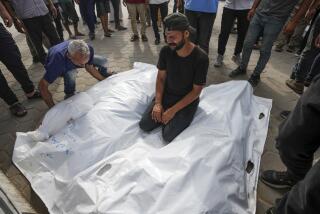PLO Asks U.N. to Send Troops to West Bank
- Share via
GENEVA — Leaders of the Palestine Liberation Organization have asked the United Nations to send troops to protect Palestinians fighting against the Israeli occupation of the West Bank and the Gaza Strip.
According to PLO officials and diplomats based in Geneva, PLO leader Yasser Arafat made the request in a private meeting here Saturday with U.N. Secretary General Javier Perez de Cuellar. Arafat also asked Perez de Cuellar for U.N. money to promote economic development in the occupied territories, they said.
Western diplomats said they believe that the PLO request was part of a campaign to line up support for an expected PLO announcement declaring the formation of a Palestinian state and a provisional government. Such a declaration of statehood, if coupled with a renunciation of terrorism, would tend to pressure Israel to negotiate a withdrawal from occupied territories.
Arafat is expected to address the European Parliament at Strasbourg next month and at least hint at the PLO’s new position.
But there is no indication that the United Nations is going to consider sending troops or observers to the West Bank and Gaza Strip, and some of the Western diplomats were openly disdainful of the PLO request, describing it as unrealistic. Economic aid is also considered unlikely, because the United Nations is presently experiencing severe financial difficulties.
Arafat’s call for U.N. protection of the rebellious Palestinians was repeated Monday by Zehdi Labib Terzi, the PLO’s representative at U.N. headquarters, in a speech to U.N.-affiliated groups here.
Council Statements Cited
Terzi cited recent U.N. Security Council statements expressing concern over Israel’s handling of the Palestinian uprising, and added, “It would have been better . . . to provide protection to the Palestinian people under occupation--protection by different ways and means--physical (protection), by sending United Nations observers or force.”
A nine-month uprising in the territories, where 1.5 million Palestinians live, has left more than 240 people dead, most of them at the hands of Israeli soldiers.
Establishment of a state and a provisional government by the PLO have been expected since Jordan’s King Hussein on July 31 announced his government’s disengagement from the West Bank, which Israel captured from Jordan in 1967.
Hussein’s move left a political vacuum that the PLO apparently plans to fill. The PLO intends to justify statehood based on a 1947 U.N. plan that would have divided the British mandate territory of Palestine into Jewish and Arab sectors as a step toward creating two separate states, PLO officials say.
By basing a Palestinian state on the old partition plan, the PLO would tacitly recognize the legality of Israel, a move the group has resisted through four decades.
PLO officials here said that recognition would only amount to facing reality and coming to terms with a well-established Israel.
“We are willing to accept what we were not 40 years ago,” one said.
However, these officials conceded, many members of the PLO oppose recognition of Israel, even by implication. Radical factions attached to Syria are said to be among the holdouts. Such divisions nurture Israeli fears that a Palestinian state would serve as a springboard for a PLO attempt to attack Israel.
Internal battles have discouraged the PLO from trying to set the legal frontiers of a new state, and PLO officials said frontiers would be the subject of future talks with Israel.
“We want legitimacy,” one PLO official said. “Geography can wait.”
Designs for a provisional government are being studied. The PLO has sought advice from scholars and governments on how to form a government that would win broad diplomatic recognition.
More to Read
Sign up for Essential California
The most important California stories and recommendations in your inbox every morning.
You may occasionally receive promotional content from the Los Angeles Times.










